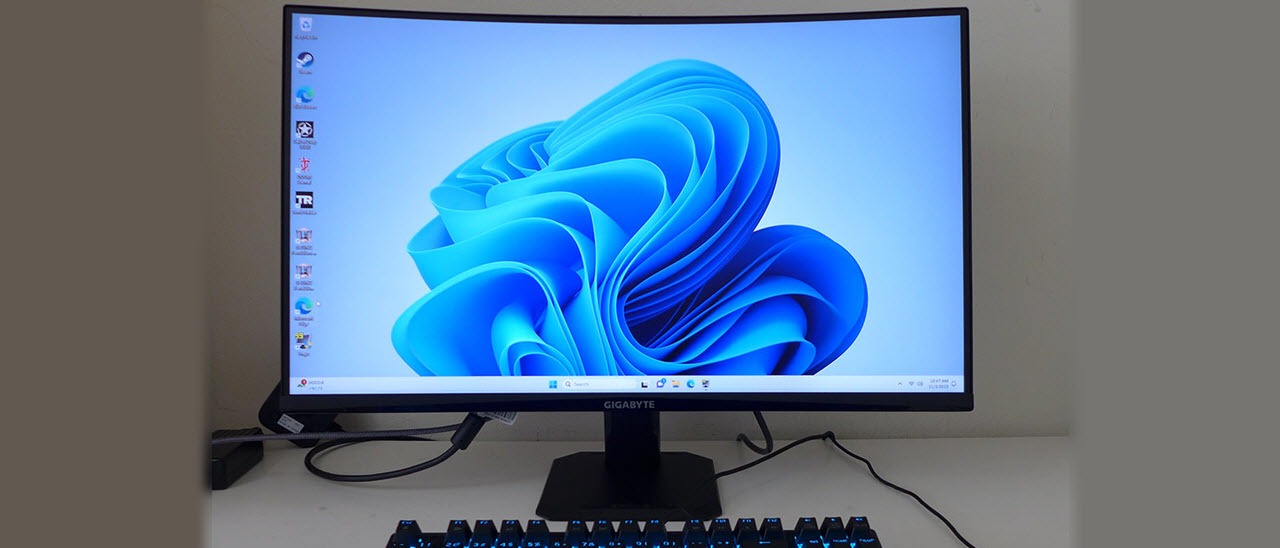Why you can trust Tom's Hardware
To read about our monitor tests in-depth, please check out Display Testing Explained: How We Test PC Monitors. We cover brightness and contrast testing on page two.
Uncalibrated – Maximum Backlight Level
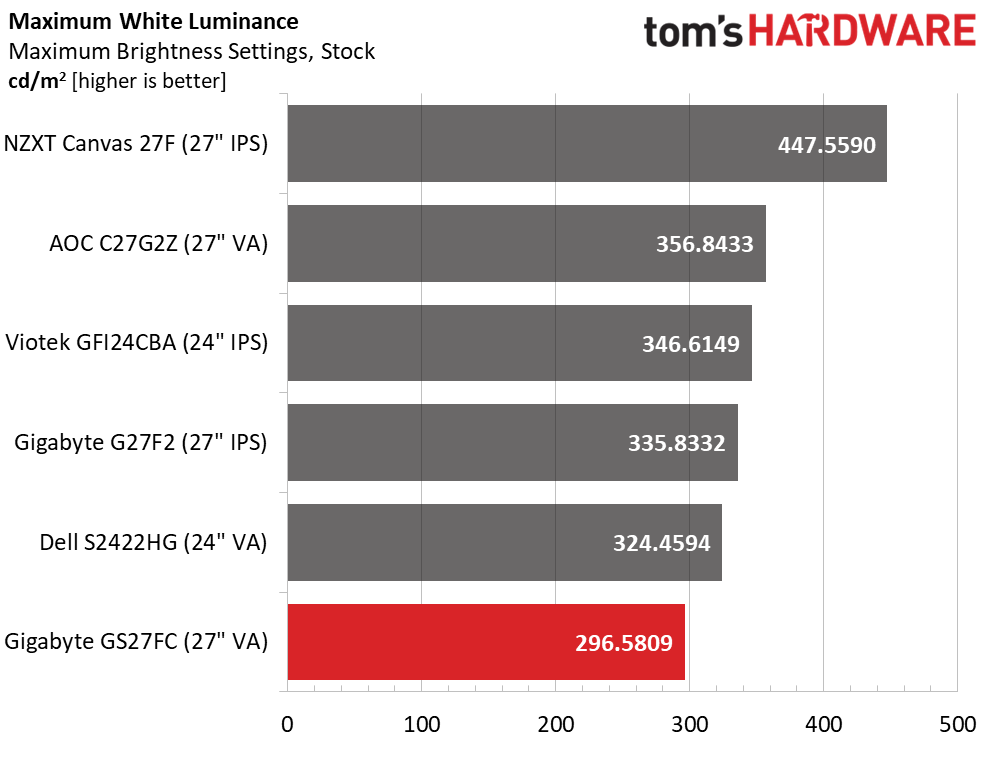
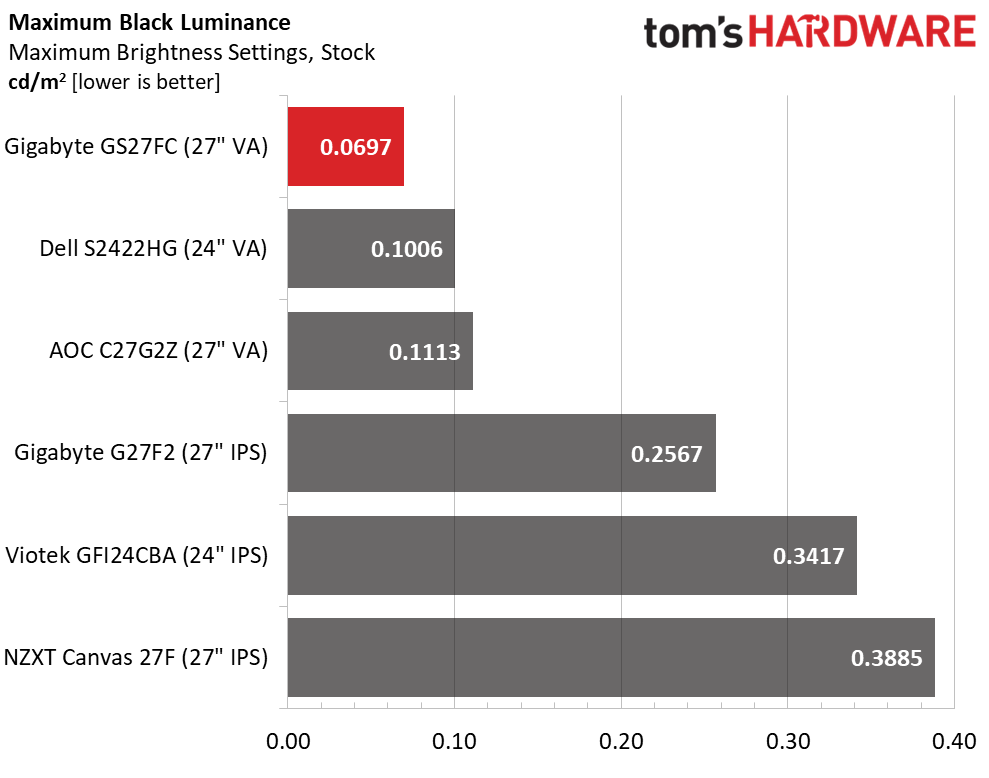
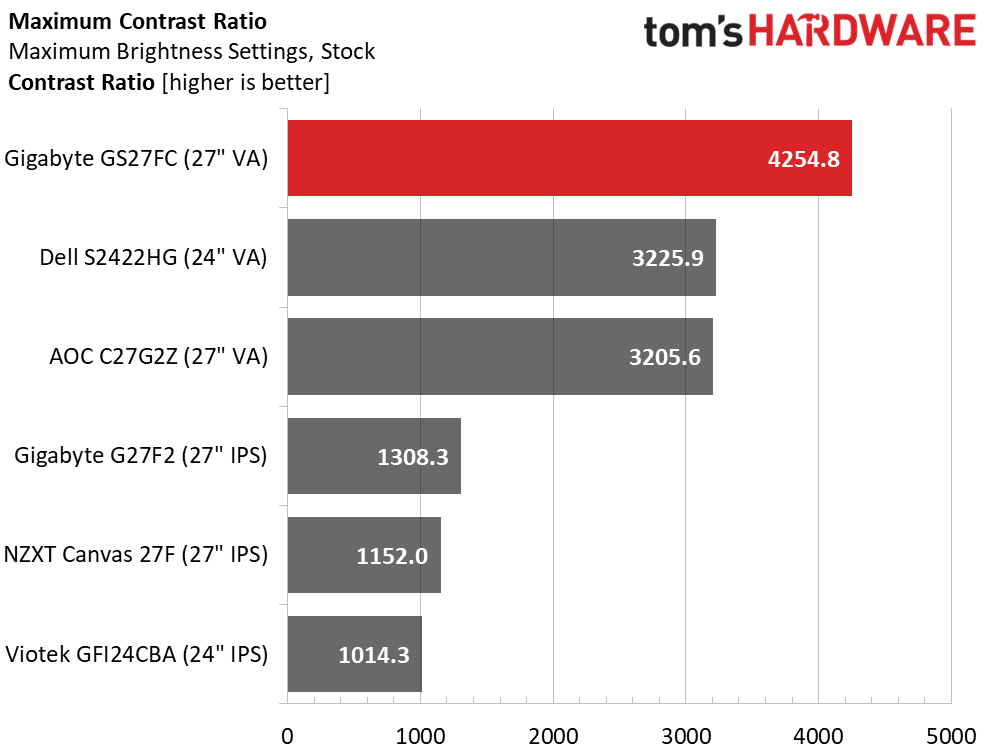
Gigabyte rates the GS27FC at just 250 nits peak brightness, which is less than most of its competition. My sample measured just shy of 300, putting it firmly in the category of bright enough. For SDR content, you won’t need more light than this unless you use the monitor in a very bright environment. However, it would be nice to have some extra overhead for HDR. You’ll see later in the HDR tests that there is a little more brightness for that content.
Black levels and contrast put the GS27FC at the head of the pack with well over 4,000:1 available. This gives the picture a lot of depth and dimension, thanks to true blacks. It makes the screen seem brighter than it actually is. And it increases perceived color saturation.
After Calibration to 200 nits
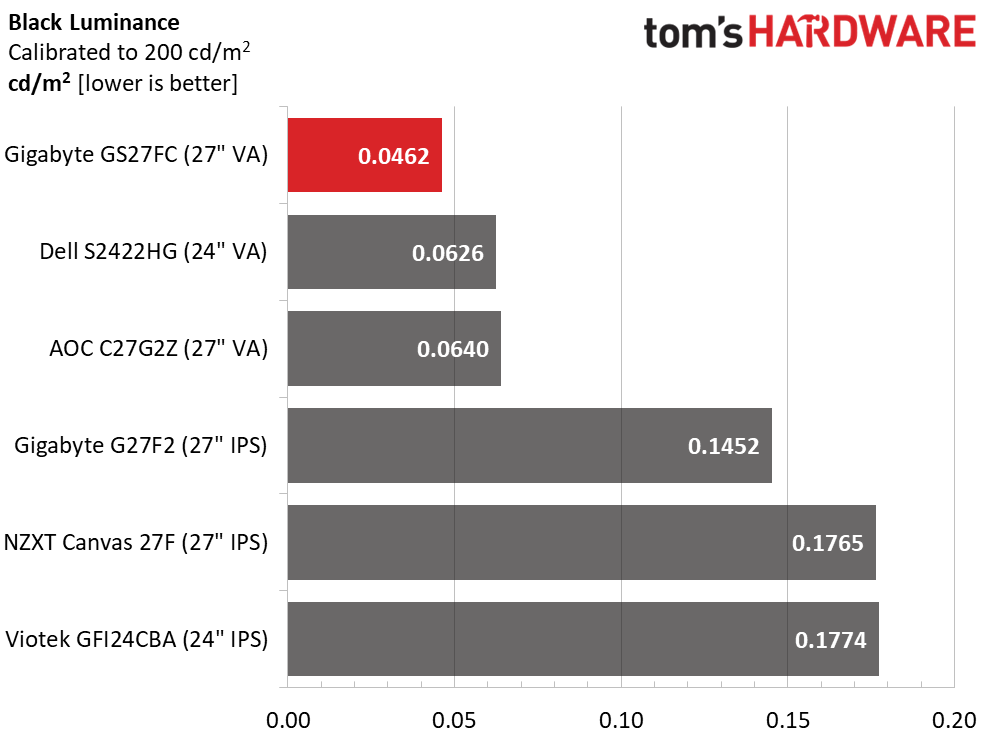
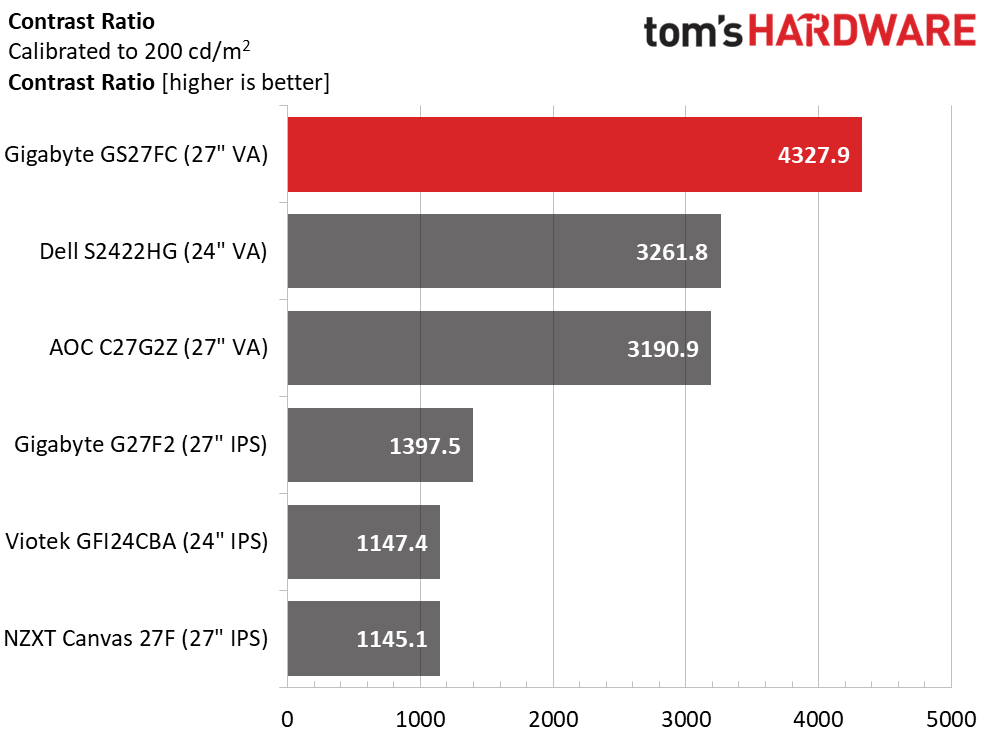
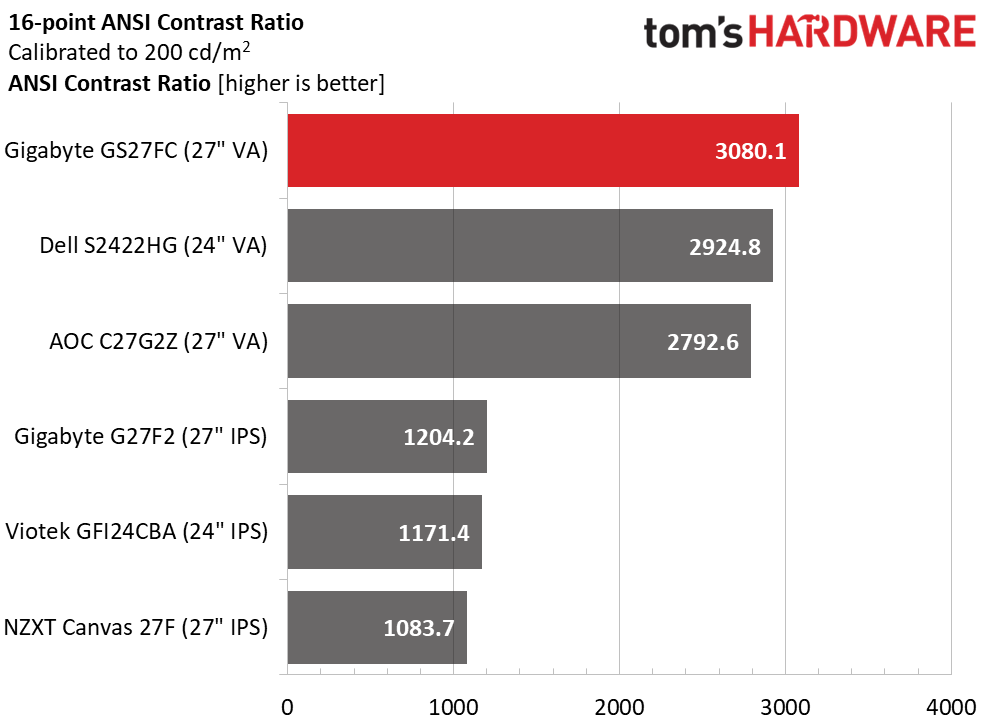
Calibration ups the contrast slightly to 4,327.9:1, one of the highest scores I’ve recorded for an LCD panel. This is the GS27FC’s native state with no dynamic mode engaged. For budget-oriented VA panels, it doesn’t get much better.
Intra-image contrast is about 29% lower but still high enough to win this comparison by a nose. The image is very satisfying, thanks to Gigabyte’s component choices. The GS27FC has one of the better VA parts I’ve seen of late.
Test Takeaway: The GS27FC makes up for its relatively small color gamut with excellent contrast which is due to very low black levels. The benefit of this cannot be overstated. Contrast is king and the GS27FC is sitting on the throne among inexpensive 27-inch gaming monitors. It’s a tremendous value when overall picture quality is the primary comparison criteria.
MORE: Best Gaming Monitors
Get Tom's Hardware's best news and in-depth reviews, straight to your inbox.
MORE: How We Test PC Monitors
MORE: How to Buy a PC Monitor
MORE: How to Choose the Best HDR Monitor
Current page: Brightness and Contrast
Prev Page Response, Input Lag, Viewing Angles and Uniformity Next Page Grayscale, Gamma and Color
Christian Eberle is a Contributing Editor for Tom's Hardware US. He's a veteran reviewer of A/V equipment, specializing in monitors. Christian began his obsession with tech when he built his first PC in 1991, a 286 running DOS 3.0 at a blazing 12MHz. In 2006, he undertook training from the Imaging Science Foundation in video calibration and testing and thus started a passion for precise imaging that persists to this day. He is also a professional musician with a degree from the New England Conservatory as a classical bassoonist which he used to good effect as a performer with the West Point Army Band from 1987 to 2013. He enjoys watching movies and listening to high-end audio in his custom-built home theater and can be seen riding trails near his home on a race-ready ICE VTX recumbent trike. Christian enjoys the endless summer in Florida where he lives with his wife and Chihuahua and plays with orchestras around the state.
-
pug_s It doesn't look like a sale price. Last month I brought a Lenovo 27" FHD 165 refresh rate monitor for $100 from Microcenter but I ended up returning it when I brought an LG 34" 160hz 3440 x 1440 ultrawide for $200 instead.Reply -
ThomasKinsley Reply
I definitely agree. $180 for a FHD VA panel seems rather expensive, and 1080p at 27'' is noticeably blurry. 1440p is a big step up. You can even snag a 4k 60hz at that price.pug_s said:It doesn't look like a sale price. Last month I brought a Lenovo 27" FHD 165 refresh rate monitor for $100 from Microcenter but I ended up returning it when I brought an LG 34" 160hz 3440 x 1440 ultrawide for $200 instead. -
Order 66 I've said it before numerous times and I'll say it again, VA monitors generally have issues with motion rendering making it look like there is heavy motion blur. If there is a VA monitor that doesn't have these motion issues, I would maybe consider it, but right now, no.Reply -
kjfatl Can anyone actually tell the difference between a 120Hz and an 180Hz refresh rate? If anything, 180Hz might slow down the system response time due to the extra GPU and CPU cycles?Reply
I would like to see the results with a blind test of 'expert' gamers.
It is my understanding that the upper limit for human perception to a drastic change in light is about 200Hz. -
pug_s Reply
Depends on the person. A good number of people can tell the difference betwen 60hz and 120hz. But IMO, I doubt anybody could tell the difference anything 120hz and above.kjfatl said:Can anyone actually tell the difference between a 120Hz and an 180Hz refresh rate? If anything, 180Hz might slow down the system response time due to the extra GPU and CPU cycles?
I would like to see the results with a blind test of 'expert' gamers.
It is my understanding that the upper limit for human perception to a drastic change in light is about 200Hz.
